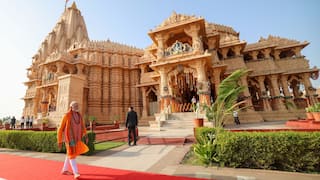J&K: Three Soldiers Killed After Avalanche Hits Army Patrol In Kupwara District
The deceased have been identified as Mukesh Kumar, Gaikwad Lakshma Rao and Souvik Hazra. They belonged to Army’s 56 Rashtriya Rifles.

New Delhi: Three soldiers were killed after an avalanche hit an army patrol in north Kashmir’s Machil area in Kupwara district on Friday, the Indian Army said on Saturday.
According to a report by news agency AP, a slide of snow hit the north-western Machil sector in Kashmir and trapped three soldiers on a patrol, said Col. Emron Musavi, an Indian army spokesperson. He said that the three were rescued and rushed to a hospital where they succumbed.
The deceased have been identified as Mukesh Kumar, Gaikwad Lakshma Rao and Souvik Hazra. They belonged to Army’s 56 Rashtriya Rifles.
“Two soldiers stuck in the snow were rescued and evacuated to the Military Hospital, Kupwara. Another soldier, who was part of the patrol, developed hypothermia and was also evacuated. Later, all the three bravehearts could not survive,” the Army said.
Notably, the avalanche hit the snow-bound Machil sector just a day ahead of a fresh spell of snowfall in the higher reaches, as predicted by the meteorological department.
According to the weather office, “cloudy with possibility of light to moderate rain in plains and snowfall at scattered places over higher reaches” has been forecast on November 19 and 20.
Meanwhile, according to Defence sources, a fresh weather advisory has been issued with the soldiers guarding forward posts, and they have been asked to take precautionary measures while performing duties in avalanche prone areas.
It is to be noted that avalanches and landslides are very common in the Valley. Avalanches have caused some of the heaviest tolls for the Indian and Pakistani armies camping in the region.
In a similar incident in 2017, at least 20 Indian soldiers were killed in three avalanches.
Earlier in 2012, a massive avalanche in the Valley killed 140 people, including 129 Pakistani soldiers.





































